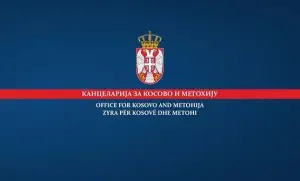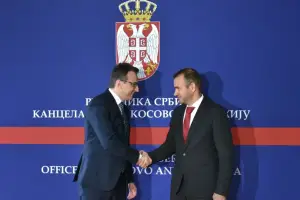- Serbia
Get to know Serbia
- Citizens
Culture and science
Health services
Pension and disability insurance
- Business
Employment
Economy
- Media
- Government
- Contact
Keep in touch
Contact form
Back
Keepin touch
Whether you have a question, comment, suggestion or any problem in the purview of the government, send us your message and we will try to respond as soon as possible. If your problem is not in our purview, we will forward your message to the relevant institution.
Q:
A:
Serb youth killed in Gracanica
Belgrade,
5 June 2004
17-year old Dimitrije Popovic was shot and killed in Gracanica early this morning at 2:05 am. Popovic was shot in the head twice as he was standing at a fast food kiosk with a few friends.
Four Serb youths were standing at a kiosk in the city centre of Gracanica, when a white Audi 80 with Kosovo license plates pulled over, and a person got out opening fire.
Popovic was a third-year secondary school student of medicine in Gracanica.
Kosovo police arrested today two ethnic Albanians suspected of murdering the boy.
The Orthodox Eparchy of Raska and Prizren condemned in the harshest terms this morning's murder of Dimitrije Popovic. After the recent attack on Blagoje Orlovic from Gornji Strmac near Zubin Potok, this is just one in a series of ethnic crimes against the Serb community. This is further proof that Serbs in Kosovo-Metohija are not safe even in the largest Serb enclaves. Since the arrival of international peacekeeping forces in June 1999, more than 2,300 Serbs have been killed or are still missing, read the statement.
Almost three months after the March pogrom in which ethnic Albanian terrorists killed nine and expelled around 4,000 Serbs, ethnic terror and violence has continued with the aim of creating a monoethnic Albanian Kosovo and expelling all Serbs from the province.
Apart from the immediate perpetrators of this crime, who have been arrested, the responsibility for continuing ethnic violence in the province rests with the so-called UN peacekeeping mission, who have still not arrested a single organiser of the March violence, nor shown any readiness to curb Albanian terrorism, which has been operating freely against Serbs and other non-Albanians, as well as against ethnic Albanians who are against the rule of terror and mafia.
The KFOR command is especially responsible, since KFOR check points at the entrance of Gracanica were closed few days ago. These check points gave a minimum of safety to Serbs because all Albanian vehicles that pass through Gracanica were checked, and possible escape of attackers was impossible. It is demonstrated once more that the reduction of KFOR forces gives a green light to ethnic Albanian terrorists to continue with the attacks on unprotected Serb civilians.
The Orthodox Eparchy of Raska and Prizren urges the international mission of the UN and KFOR now for the nth time to efficiently protect Serb enclaves and unprotected Serb population instead of passively registering crimes. The Eparchy also reiterates that the major post-war crimes against Serbs have still not been resolved (attack on the Nis Ekspres bus in 2001, the killing of the Stolic family in April 2003, and the massacre of Serb children in Gorazdevac in August 2003), as well as numerous other attacks on civilians and sacred sites of the Serbian Orthodox Church.
Popovic was a third-year secondary school student of medicine in Gracanica.
Kosovo police arrested today two ethnic Albanians suspected of murdering the boy.
The Orthodox Eparchy of Raska and Prizren condemned in the harshest terms this morning's murder of Dimitrije Popovic. After the recent attack on Blagoje Orlovic from Gornji Strmac near Zubin Potok, this is just one in a series of ethnic crimes against the Serb community. This is further proof that Serbs in Kosovo-Metohija are not safe even in the largest Serb enclaves. Since the arrival of international peacekeeping forces in June 1999, more than 2,300 Serbs have been killed or are still missing, read the statement.
Almost three months after the March pogrom in which ethnic Albanian terrorists killed nine and expelled around 4,000 Serbs, ethnic terror and violence has continued with the aim of creating a monoethnic Albanian Kosovo and expelling all Serbs from the province.
Apart from the immediate perpetrators of this crime, who have been arrested, the responsibility for continuing ethnic violence in the province rests with the so-called UN peacekeeping mission, who have still not arrested a single organiser of the March violence, nor shown any readiness to curb Albanian terrorism, which has been operating freely against Serbs and other non-Albanians, as well as against ethnic Albanians who are against the rule of terror and mafia.
The KFOR command is especially responsible, since KFOR check points at the entrance of Gracanica were closed few days ago. These check points gave a minimum of safety to Serbs because all Albanian vehicles that pass through Gracanica were checked, and possible escape of attackers was impossible. It is demonstrated once more that the reduction of KFOR forces gives a green light to ethnic Albanian terrorists to continue with the attacks on unprotected Serb civilians.
The Orthodox Eparchy of Raska and Prizren urges the international mission of the UN and KFOR now for the nth time to efficiently protect Serb enclaves and unprotected Serb population instead of passively registering crimes. The Eparchy also reiterates that the major post-war crimes against Serbs have still not been resolved (attack on the Nis Ekspres bus in 2001, the killing of the Stolic family in April 2003, and the massacre of Serb children in Gorazdevac in August 2003), as well as numerous other attacks on civilians and sacred sites of the Serbian Orthodox Church.
-
 Belgrade, 1 March 2026
Belgrade, 1 March 2026Five Serbs from village of Suvo Grlo near Srbica in Kosovo and Metohija detained
-
 Belgrade, 25 February 2026
Belgrade, 25 February 2026Priština endangers survival of Serbs in Kosovo and Metohija with escalatory moves
-
 Belgrade, 12 February 2026
Belgrade, 12 February 2026Gratitude to Spain for consistent support on Kosovo and Metohija issue
-
 Belgrade, 10 February 2026
Belgrade, 10 February 2026Belgrade seeks urgent EU response over pressures on Serbian institutions in Kosovo and Metohija
-
 Belgrade, 5 February 2026
Belgrade, 5 February 2026UNMIK’s greater visibility, presence needed on ground
-
 Belgrade/Brussels, 22 January 2026
Belgrade/Brussels, 22 January 2026Accelerate resolution of issue of missing persons
-
 Belgrade, 16 January 2026
Belgrade, 16 January 2026Concrete steps needed to establish Community of Serb Municipalities
-
 Belgrade, 11 December 2025
Belgrade, 11 December 2025Belgrade firmly committed to peace, stability in region
-
 Belgrade/Rome, 10 December 2025
Belgrade/Rome, 10 December 2025Belgrade doing everything to preserve peace, stability in Kosovo and Metohija



